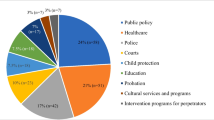Abstract
Recent decades have seen a significant increase in physicians participating in international short-term missions to regions with limited or no access to health care by virtue of natural disaster or lack of resources. Recent publications in the ethics literature have explored the potential of these missions for unintentional harm to the intended beneficiaries. Less has been discussed about how to respond when harm actually occurs. The authors review the ethical issues raised by short-term medical and humanitarian missions and the literature on responding to unintended error to provide guidelines for avoiding harm to the intended beneficiaries of missions and an appropriate response when harm occurs. Two cases demonstrating an analysis and response to unintended harm are presented.
Similar content being viewed by others
References
Association of American Medical Colleges. (2018). Medical school graduation questionnaire: 2018 all schools summary Report. https://www.aamc.org/download/490454/data/2018gqallschoolssummaryreport. Accessed 8 Dec 2019.
Battat, R., Seidman, G., Chadi, N., Chanda, M. Y., Nehme, J., Hulme, J., et al. (2010). Global health competencies and approaches in medical education: A literature review. BMC Medical Education, 10, 94.
Bell, S. K., Delbanco, T., Anderson-Shaw, L., McDonald, T. B., & Gallagher, T. H. (2011). Accountability for medical error: Moving beyond blame to advocacy. Chest, 140(2), 519–526.
Berlinger, N. (2005). After harm: Medical error and the ethics of forgiveness. Johns Hopkins University Press: Baltimore, MD.
Clinton, H. R., & Obama, B. (2006). Making patient safety the centerpiece of medical liability reform. The New England Journal of Medicine, 354(21), 2205–2208.
Crump, J. A., & Sugarman, J. (2008). Ethical considerations for short-term experiences by trainees in global health. JAMA, 300(12), 1456–1458.
DeCamp, M. (2011). Ethical review of global short-term medical volunteerism. HEC Forum, 23(2), 91–103.
Elgafi, S. (2014). Medical liability in humanitarian missions. The Journal of Humanitarian Assistance. https://sites.tufts.edu/jha/archives/2111. Accessed 8 Dec 2019.
Farmer, P. (2005). Pathologies of power: Health, human rights, and the new war on the poor. University of California Press: Los Angeles, CA.
Gallagher, T. H., Studdert, D., & Levinson, W. (2007). Disclosing harmful medical errors to patients. The New England Journal of Medicine, 356(26), 2713–2719.
Khan, O. A., Guerrant, R., Sanders, J., Carpenter, C., Spottswood, M., Jones, D. S., et al. (2013). Global health education in U.S. medical schools. BMC Medical Education, 13, 3.
Kirpich, A., Weppelmann, T. A., Yang, Y., Morris, J. G., & Longini, I. M. (2017). Controlling cholera in the Ouest Department of Haiti using oral vaccines. PLOS Neglected Tropical Diseases, 11(4), e0005482. https://doi.org/10.1371/journal.pntd.0005482.
Kohn, L. T., Corrigan, J. M., & Donaldson, M. S. (Eds.). (1999). To err is human: Building a safer health system. National Academy Press: Washington D.C.
Langowski, M. K., & Iltis, A. (2011). Global health needs and the short-term medical volunteer: Ethical considerations. HEC Forum, 23(2), 71–78.
Lazare, A. (2006). Apology in medical practice: An emerging clinical skill. The Journal of the American Medical Association, 289(8), 1001–1007.
LeMieux, J. (2016). Cholera in Haiti: The UN finally concedes what science showed years ago. American Council on Science and Health. https://www.acsh.org/news/2016/09/01/cholera-haiti-un-finally-concedes-what-science-showed-years-ago-9866. Accessed 8 Dec 2019.
O’Neil, E. O. (2006). The “ethical imperative” of global health service. Virtual Mentor, 8(12), 846–850.
Pan American Health Organization (2018). Epidemiological update Cholera. https://www.paho.org/hq/dmdocuments/2016/2016-sept-12-cha-epi-update-cholera.pdf. Accessed 8 Dec 2019.
Pellegrino, E. D. (2004). Prevention of medical error: Where professional and organizational ethics meet. In V. A. Sharpe (Ed.), Accountability: Patient safety and policy reform. Georgetown University Press: Washington D.C.
Piarroux, R., Barrais, R., Faucher, B., Haus, R., Piarroux, M., Gaudart, J., et al. (2011). Understanding the cholera epidemic, Haiti. Emerging Infectious Diseases, 17(7), 1161–1167.
Robbennolt, J. K. (2003). Apologies and legal settlement: An empirical examination. Michigan Law Review, 102(3), 460–515.
Taft, L. (2007). Disclosure danger: The overlooked case of the cooperationg clause. Harvard Health Policy Review, 8(2), 46–53.
Wall, A. (2011). The context of ethical problems in medical volunteer work. HEC Forum, 23(2), 79–90.
Weinmeyer, R. (2016). Pursuing justice in Haiti’s cholera epidemic. AMA Journal of Ethics, 18(7), 718–726.
Welling, D. R., Ryan, J. M., Burris, D. G., & Rich, N. M. (2010). Seven sins of humanitarian medicine. World Journal of Surgery, 34(3), 466–470.
Zientek, D. M. (2010). Medical error, malpractice and complications: A moral geography. HEC Forum, 22(2), 145–157.
Author information
Authors and Affiliations
Corresponding author
Additional information
Publisher's Note
Springer Nature remains neutral with regard to jurisdictional claims in published maps and institutional affiliations.
Rights and permissions
About this article
Cite this article
Zientek, D., Bonnell, R. When International Humanitarian or Medical Missions Go Wrong: An Ethical Analysis. HEC Forum 32, 333–343 (2020). https://doi.org/10.1007/s10730-019-09392-6
Published:
Issue Date:
DOI: https://doi.org/10.1007/s10730-019-09392-6




